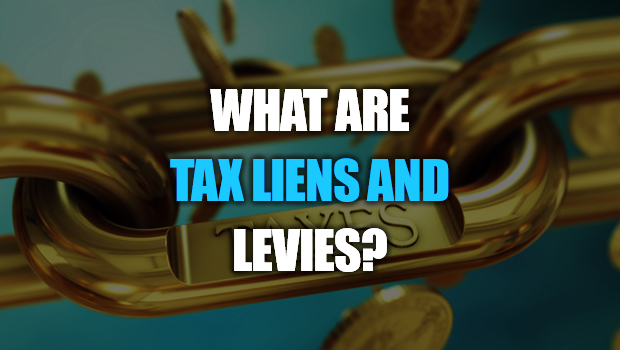If you get behind on your taxes, you will accrue a tax debt. Tax departments and agencies have special tools to make sure you pay unpaid taxes. Two of the most powerful include the tax lien and tax levy. Let’s take a look at what these are and how they work.
What Are Tax Liens?
A tax lien is a government claim to a taxpayer’s property because that taxpayer is behind on his or her taxes. Tax liens can come from various government entities, such as the Internal Revenue Service (IRS) and a state department of revenue like the California Tax Franchise Board (FTB).
The purpose of a tax lien is to give notice to others (such as creditors) that the IRS or FTB has a claim against a taxpayer’s property. This tells them to stay away from the property if the taxpayer is trying to sell it or use it to pay off another debt. Depending on who has filed the tax lien and where it’s filed, the lien could apply to all of a taxpayer’s property, including real estate, personal property and financial assets.
If the IRS wants to get a tax lien, it will file a Notice of Federal Tax Lien. If the FTB wants to get a tax lien, they’ll file one with a county recorder (to place a lien on real property) and/or California Secretary of State (to place a lien on personal property).
What Are Tax Levies?
Tax levies are far more serious than tax liens. That’s because it involves the tax authority taking property away from the taxpayer. When the IRS, FTB or tax authority gets a tax levy, they can physically take personal property away from the taxpayer or withdraw money from a bank or financial account. The IRS has the authority to add a monthly levy of 15% of a Social Security benefit check!
A tax levy can apply to almost any property, although there are laws that limit what property (or how much) can be subject to a levy.
How Do You Remove a Tax Lien?
Assuming you want to keep your property from the IRS or FTB and the tax lien was properly placed, the best way to remove a tax lien is to pay the back taxes owed. But this often isn’t possible, because if it was, the taxpayer probably never would have allowed the tax lien to begin with. If the tax lien comes from the IRS, a taxpayer can remove a tax lien through:
- The discharge of property. This only removes the lien from a particular piece of property.
- A withdrawal
Note that subordination is also something taxpayers can do to deal with a tax lien. However, it doesn’t remove the lien. Instead, it just lowers its priority in relation to other creditors. This is useful in situations where the taxpayer wants to apply for a loan or mortgage.
How Do You Remove a Tax Levy?
As is the case with a tax lien, if the IRS places a tax levy against a taxpayer, the best way to remove it is to pay off the tax debt. But an IRS tax levy can be removed in other ways, such as:
- Proving to the IRS that removing the lien will make it easier to pay back taxes.
- Showing that the levy was issued after the tax collection period ended.
- Explaining that the property subject to the levy is worth more than the tax debt and that releasing the levy will not hurt the IRS’ ability to collect its debt.
- Demonstrating that the levy creates an economic hardship on the taxpayer such that they can’t pay for basic living expenses.
- Entering into an Installment Agreement with terms that include stopping the levy.
Keep in mind that with most of these options where a levy is released, the taxpayer still has to pay the underlying tax debt.
Conclusion
If the IRS, FTB or other tax authority has placed a tax lien or levy on your property, you need to take your tax debt seriously. In these situations, it might be a good idea to hire a tax attorney to help you get rid of them. They can provide the best advice to make the process as quick and easy as possible, as well as save you money.
There could also be circumstances where there’s a legal defect in the tax levy or lien. While not common, they provide another option, although you’ll want a tax attorney to help you navigate through the process of challenging the lien or levy on legal grounds.
The good news is Kienitz Tax Law is here to help you with your tax issues. Schedule your FREE consultation today!

